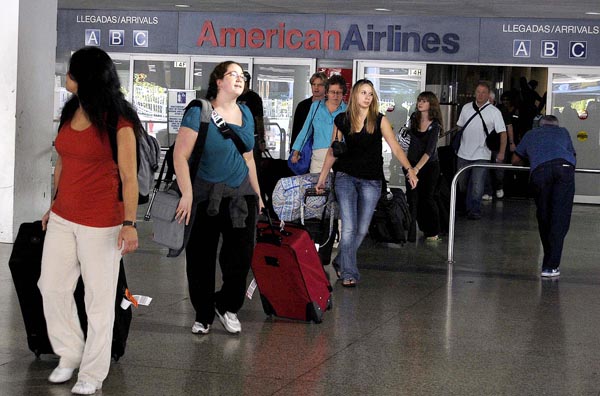Report: Mass exodus from P.R. to US impacts healthcare, politics


The island has witnessed a massive migration to the U.S. unlike anything experienced in recent times, and its repercussions in healthcare are impacting the system and alerting the need for funding revision. (Credit: © Mauricio Pascual)
The mass exodus of Puerto Ricans to the U.S. mainland are already having an impact on federal health system funding and will surely influence the upcoming electoral cycle, according to a report published by San Juan-based Impactivo Consulting.
Statistical data points to more than 300,000 migrants fleeing the island since September 2017. Projecting those numbers into the next few years could mean an exodus of more than 470,000 Puerto Ricans by 2020.
That would account for 14 percent of the island’s population. In the majority of cases, those leaving are settling in the continental U.S. Some 212,000 Puerto Ricans may migrate to one of the 50 states in the next year alone, with Florida expected to welcome the largest influx — of perhaps 82,000 native islanders, according to experts cited in the report.
“Puerto Rico’s 2017 hurricane season swept away more than homes and its electrical grid. The island has witnessed a massive migration to the U.S. unlike anything experienced in recent times, and its repercussions in healthcare are impacting the system and alerting the need for funding revision,” Impactivo officials said.
The report, “Weighing the Effects of Puerto Ricans to the U.S. on Health System Funding,” sheds light on this vital issue, and the impact of said massive migration as Puerto Ricans continue to settle throughout the mainland, changing the “face, cost and structure” of healthcare needs, as well as the economic and political repercussions resulting from this unforeseen migratory pattern.
According to the report, Puerto Ricans are migrating to the 50 states at a pace not seen since the Island’s residents became U.S. citizens in 1918. The calamities of Hurricanes Irma and María have been a decisive blow for residents already facing a decade long recession, a bankrupt local government and a federal funding crisis that has been cutting bare health care programs.
Impactivo has published a wide array of reports explaining how Federal Medicaid Funding Caps, the reduced Federal Medicaid Assistance Percentage (FMAP) and unequal treatment in Medicare Advantage for Puerto Rico, potentially implemented by U.S. Congress as cost containment measures, have cost federal and state governments more to cover those who have left the island than it would have cost them to provide for Puerto Rico the same level of funding provided to States due to the externalities produced by migration.
The January issue brief report explains why providing the island with equal treatment for federal healthcare and human services programs would prove to be the right thing to do, as well as the most fiscally responsible solution for the government, both federal and state.
“Our research shows that two thirds of people living in Puerto Rico have recently considered moving to the United States to receive better health systems making this issue top of mind when people decide to migrate” said Maria Levis, CEO of Impactivo.
“Many Puerto Ricans who moved to the states after Hurricane María are still interested in returning home and increased federal investments in health care would create an environment of confidence which would facilitate their return,” she added.
The report also notes major political shifts which could also result from this migratory wave in upcoming electoral cycles, as Puerto Ricans have a high voting participation tradition, and potentially impact the political structure in the states where they have settled into.
The 2018 midterm elections will put all 435 seats in the House of Representatives on the line, as well as 33 Senate seats and almost 40 governor posts, at a time when more Puerto Ricans are likely to express their political voice.
Among potential solutions presented to alleviate the impending situation include funding to strengthen the Puerto Rico health system through a Disaster Relief Package, a permanent solution for Medicaid inequities through the Children’s Health Insurance Program (CHIP) Reauthorization Act (CHIP), still pending legislation, and returning Medicare Advantage formulas to Pre-Affordable-Act levels.
These measures could help alleviate the island’s funding crisis, and facilitate the process for Puerto Ricans to return home, the report concluded.
“ With an improved healthcare service scenario, many families are likely to return which would help the island revitalize,” it noted.














My $3,800 triple by-pass in PR 11 years ago would have been at least $80,000 in corrupt IL Chicago and Medicare would have paid a lot more! So, proportionate loss of Medicare Funds to PR, if I left has no real impact except to those who steal a percentage of the total.
If all but me and the native Tainos are left, we won’t need much to care for those remaining, if we can fly to the states to be repaired where Obamacare costs ever more each year. A new PR government now in the cards.
Who will move to make it happen?